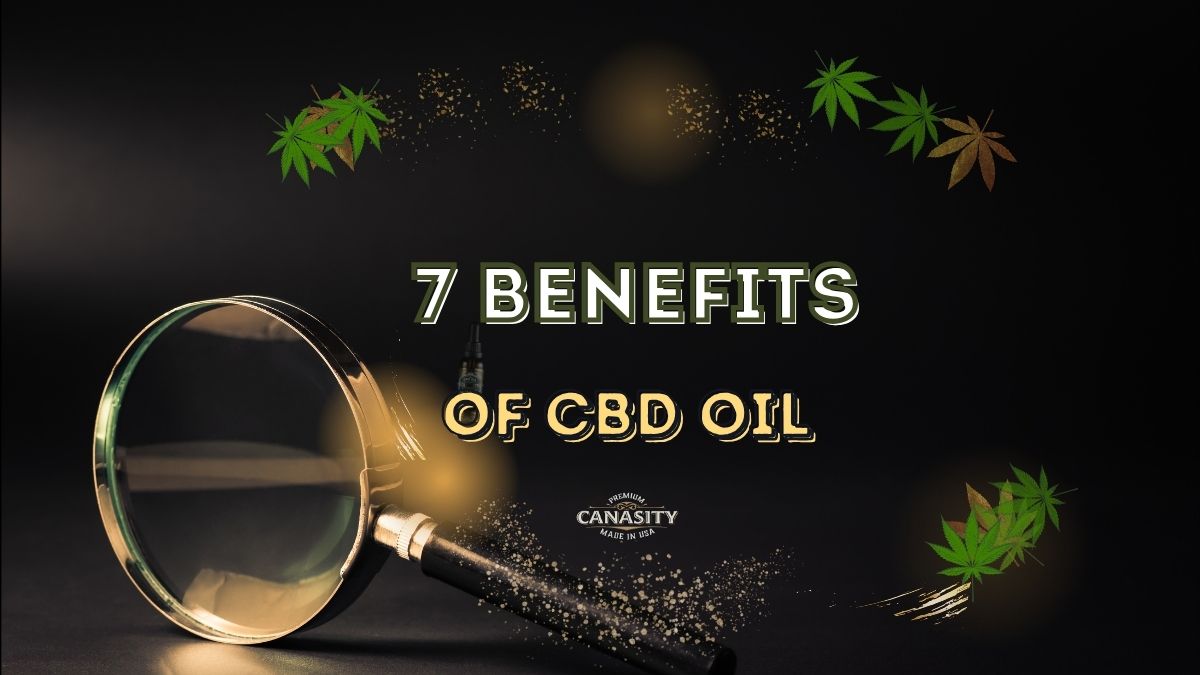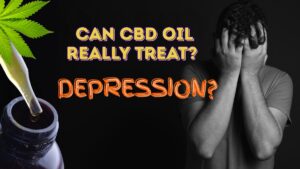In recent years, one compound has been making waves in the world of natural health and wellness: CBD, or cannabidiol. As its popularity has grown, so has the curiosity about the benefits of CBD oil. So, what’s behind this popularity? What is CBD oil good for, and how scientifically supported are its purported benefits?
In this comprehensive guide, we examine the most talked-about potential benefits of CBD oil through the lens of scientific research, in a clear and hype-free language. From pain management to better sleep, from fighting anxiety to supporting skin health, get ready to discover CBD’s role in our bodies and how it might support your quality of life.
What Is CBD (Cannabidiol) and How Does It Interact with Our Bodies?
First, let’s answer a fundamental question: What is CBD? Cannabidiol is one of over 100 natural compounds (cannabinoids) found in the hemp plant. Although it’s often confused with THC (tetrahydrocannabinol), which is responsible for the psychoactive effects of cannabis, CBD has no such effect. This means that properly produced and purified CBD products will not get you “high.”
The secret to CBD’s potential benefits lies in its ability to interact with our body’s Endocannabinoid System (ECS). The ECS is a complex cell-signaling system tasked with regulating (maintaining homeostasis for) countless physiological processes, including pain, mood, sleep, appetite, memory, and immune responses. Our body produces its own cannabinoids to maintain this balance. CBD may help the body restore its internal equilibrium and respond better to stress, pain, or other challenges by influencing this system.
1. May Help Reduce Pain and Inflammation
One of the best-known and most researched potential benefits of CBD is its role in combating chronic pain and inflammation. Millions of people live with conditions like arthritis, fibromyalgia, migraines, or general muscle soreness.
The scientific answer to the question, does CBD oil help with pain, is promising. Research shows that CBD may alleviate pain by reducing the body’s inflammatory response and by interacting with nerve receptors that perceive pain signals. Specifically, it can modulate pain perception by indirectly influencing the CB1 and CB2 receptors, which are part of the ECS. Scientific reviews have shown that CBD may be particularly effective for hard-to-treat types of pain, such as neuropathic pain (pain resulting from nerve damage).
2. Could Alleviate Anxiety and Stress Symptoms
The constant stress and worry brought on by modern life negatively impact the mental health of many. CBD has become a popular supplement for managing CBD oil for anxiety and stress as a natural calming agent.
CBD’s effect on anxiety is largely attributed to its relationship with serotonin receptors in the brain. Serotonin, also known as the “feel-good hormone,” plays a critical role in regulating mood. It’s thought that CBD may help the brain use its serotonin signals more effectively. Numerous clinical studies have shown that CBD reduces symptoms of anxiety in a range of situations, from situational anxiety like public speaking to generalized anxiety disorder.
3. May Improve Sleep Quality
A good night’s sleep is fundamental to overall health. However, many people suffer from sleep problems due to reasons like stress, pain, or anxiety. The use of CBD oil for sleep is being increasingly researched for its potential to make it easier to fall asleep and improve sleep quality.
CBD’s effect on sleep is twofold. First, it can alleviate the underlying causes of insomnia, such as pain or anxiety. A relaxed mind and a pain-free body naturally fall asleep more easily. Second, some studies suggest that CBD may help regulate the sleep-wake cycle. It has been observed that lower doses can promote alertness, while higher doses can have a calming and sleep-inducing effect.
4. May Offer Neuroprotective Effects for Neurological Disorders
CBD’s protective (neuroprotective) and regulatory effects on the brain are one of the areas of greatest interest to the scientific community. The most concrete evidence in this field is its role in the treatment of epilepsy. It has been proven to reduce seizures in treatment-resistant childhood epilepsy syndromes like Dravet and Lennox-Gastaut and has been approved as a drug called Epidiolex for this purpose.
Beyond that, thanks to its anti-inflammatory and antioxidant properties, CBD’s potential to alleviate some symptoms associated with other neurodegenerative diseases like Alzheimer’s, Parkinson’s, and multiple sclerosis (MS) is also being investigated. Although most research in this area is still in its early stages, the results are promising for the future.
5. May Support Skin Health: Acne and Inflammation
The benefits of CBD are not limited to internal health. Its powerful anti-inflammatory properties have also made it a popular ingredient in the world of skincare. The benefits of CBD oil for skin are being investigated, especially for acne and inflammatory skin conditions.
Acne is primarily caused by excess sebum (oil) production, clogged pores, and inflammation. Research shows that CBD may help prevent the skin’s sebaceous glands from producing excessive sebum and can reduce acne-related redness and swelling with its anti-inflammatory effect. It also has the potential to soothe the itching and discomfort caused by other inflammatory skin conditions like eczema and psoriasis.
6. Could Have Positive Effects on Heart Health
Emerging research suggests that CBD may also offer some benefits for the heart and circulatory system. One of the most notable findings is its potential to lower blood pressure. High blood pressure is a major risk factor for serious health problems like heart attack and stroke.
Studies have shown that even a single dose of CBD can lower blood pressure in healthy individuals exposed to stress. This effect is thought to be due to CBD’s anxiety- and stress-reducing properties. Stress hormones cause blood vessels to constrict and blood pressure to rise; by alleviating this stress, CBD may indirectly support heart health. However, more research is needed in this area.
7. May Offer Support in Managing Cancer Treatment Symptoms
This is an extremely sensitive topic and must be stated clearly: CBD does not treat cancer. However, there is growing evidence that it may play a supportive role in managing the challenging side effects of cancer treatment (like chemotherapy). Specifically, its potential to alleviate symptoms like chemo-induced nausea, vomiting, pain, and loss of appetite is being researched. This is an important step toward improving patients’ quality of life during the treatment process and its use must be under the approval and supervision of an oncologist.
How to Use CBD Oil and Find the Right Dosage
To get the most out of CBD, it’s important to find the right method of use and dose.
- Methods of Use: The most common method is to place drops of CBD oil under the tongue (sublingual). This method allows CBD to be absorbed quickly into the bloodstream. Capsules, teas, and topical creams are other options.
- Dosage: There is no “correct” dose; the dosage is individual. The best approach is the “start low, go slow” principle. Start with a low dose, such as 10-15 mg per day, and observe how your body reacts. After a few days, you can slowly increase the dose until you achieve the desired effect.
Potential Side Effects and Safety Concerns
CBD is generally considered safe and well-tolerated. However, it can cause mild side effects in some people, especially at high doses. These include dry mouth, drowsiness, changes in appetite, and diarrhea. The most important safety concern is its potential to interact with certain medications (especially blood thinners and specific antidepressants). If you take regular medication, you must consult your doctor before using CBD.
A Guide to Choosing High-Quality CBD Products
The quality of products on the market can vary greatly. To choose a safe and effective product, pay attention to these criteria:
- Third-Party Lab Testing: Check the product’s Certificate of Analysis (CoA). This verifies the product’s purity and its CBD/THC ratios.
- Organic Hemp: Ensure the product is made from organic hemp plants grown without pesticides and chemicals.
- THC Content: To avoid unwanted psychoactive effects and ensure legal compliance, choose products containing 0% THC.
Brands that prioritize transparency and quality, like Canasity, can offer reliable products that meet these standards.
Conclusion: Is CBD Oil Right for You?
The benefits of cannabidiol cover a wide spectrum that is increasingly supported by scientific evidence. It is a versatile compound that offers the potential to improve quality of life in many areas, from pain to anxiety, insomnia to skin problems.
However, it’s important to remember that CBD is not a “cure-all.” Its effects can vary from person to person, and the best results are achieved through conscious use, choosing the right product, and staying in communication with your doctor, especially if you have a health condition. If you are looking for natural support on your wellness journey, CBD oil may be an option worth exploring.
For more information, visit our FAQ page: https://canasity.com/faq/
Frequently Asked Questions (FAQ)
- How long do the effects of CBD oil last? The duration of effects can range from 2 to 6 hours, depending on the method of use and dose. Sublingual drops take effect faster, while the effects of capsules may last longer.
- What’s the difference between CBD oil and hemp seed oil? This is a very important distinction. CBD oil is extracted from the flowers of the hemp plant and is rich in cannabinoids. Hemp seed oil is pressed from the seeds, contains no CBD, and is primarily used as a nutritional food oil. You may also see it listed as hemp oil, with its own benefits, but it is not the same as CBD oil.
- Is it safe to use CBD every day? Current research suggests that daily use of CBD at recommended doses is safe for most people. It’s always a good idea to consult your doctor for long-term use.
- Which CBD product should I choose: Full-spectrum, broad-spectrum, or isolate? Isolate contains only pure CBD. Full-spectrum contains all other cannabinoids, including THC. Broad-spectrum contains all other compounds except for THC and is often considered the best option for those who want to benefit from the “entourage effect.”
- Is CBD psychoactive? Will it get me “high”? No. Pure CBD is not psychoactive. The compound responsible for the psychoactive effect of hemp is THC. Products with 0% THC do not produce this effect.
- What is the legal status of CBD? In most countries, including the US and the UK, CBD products derived from hemp with very low THC content (0.3% or less) are generally considered legal. However, it’s always important to check local regulations.
- How long will it take to see results? Some people feel relief within the first few uses, while for others it may take several weeks of regular use to see a noticeable effect in their body. Patience is key.
- Should I take CBD with food? Taking CBD oil with a meal, especially one containing healthy fats, can increase its absorption (bioavailability) in the body and enhance its effectiveness.
- Do topical CBD products (creams) really work? Yes, topical products are effective for localized relief. When applied to the skin, CBD does not enter the bloodstream but instead interacts with endocannabinoid receptors in the skin, muscles, and joints of the applied area.
Scientific Evidence and Sources Cited in the Article: (The same 7 sources used for the Turkish version are applicable here as they are from international journals.)
Brown, J. D., & Winterstein, A. G. (2019). Potential Adverse Drug Events and Drug–Drug Interactions with Medical and Consumer Cannabidiol (CBD) Use. Journal of Clinical Medicine, 8(7), 989. (Safety and Side Effects)
Vučković, S., Srebro, D., Vujović, K. S., Vučetić, Č., & Prostran, M. (2018). Cannabinoids and Pain: New Insights From Old Molecules. Frontiers in pharmacology, 9, 1259. (Pain & Inflammation)
Blessing, E. M., Steenkamp, M. M., Manzanares, J., & Marmar, C. R. (2015). Cannabidiol as a Potential Treatment for Anxiety Disorders. Neurotherapeutics, 12(4), 825–836. (Anxiety & Stress)
Shannon, S., Lewis, N., Lee, H., & Hughes, S. (2019). Cannabidiol in Anxiety and Sleep: A Large Case Series. The Permanente journal, 23, 18–041. (Sleep)
Silvestro, S., Mammana, S., Cavalli, E., Bramanti, P., & Mazzon, E. (2019). Use of Cannabidiol in the Treatment of Epilepsy: Efficacy and Security in Clinical Trials. Molecules (Basel, Switzerland), 24(8), 1459. (Neurological Disorders)
Peyravian, N., Deo, S., Daunert, S., & Jimenez, J. J. (2022). The Anti-Inflammatory Effects of Cannabidiol (CBD) on Acne. Journal of inflammation research, 15, 2795–2801. (Skin Health)
Jadoon, K. A., Tan, G. D., & O’Sullivan, S. E. (2017). A single dose of cannabidiol reduces blood pressure in healthy volunteers in a randomized crossover study. JCI insight, 2(12), e93760. (Heart Health)
Last Updated: July 1, 2025
Author: The Canasity Science Team (Reviewed by experts with 7 years of experience in cannabinoid research.)
Important Disclaimer: This article is for informational purposes and does not constitute medical advice. Before using CBD oil or any other supplement, especially if you have a chronic condition or are taking regular medication, you must consult your doctor.
















